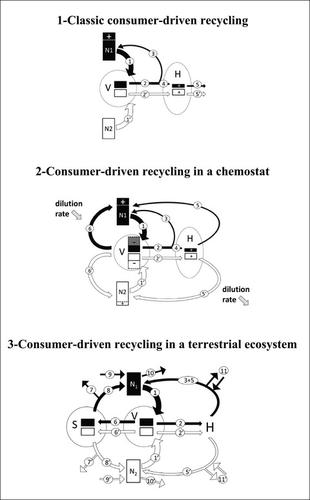当前位置:
X-MOL 学术
›
Ecol. Lett.
›
论文详情
Our official English website, www.x-mol.net, welcomes your
feedback! (Note: you will need to create a separate account there.)
A consumer-driven recycling theory for the impact of large herbivores on terrestrial ecosystem stoichiometry
Ecology Letters ( IF 7.6 ) Pub Date : 2021-09-14 , DOI: 10.1111/ele.13876 Tanguy Daufresne 1
Ecology Letters ( IF 7.6 ) Pub Date : 2021-09-14 , DOI: 10.1111/ele.13876 Tanguy Daufresne 1
Affiliation

|
Biological control of nutrient cycles is well documented in aquatic ecosystems, where consumer-driven recycling by herbivores can significantly impact ecosystem stoichiometry. In contrast, little is known in terrestrial ecosystems, where there is evidence that herbivores can also impact ecosystem stoichiometry. I studied a stoichiometric model of the soil-plant-herbivore system. The model shows that herbivores influence the ecosystem stoichiometry mainly through the direct and indirect controls of ecosystem inputs and losses, in a more complex way than predicted by the classic consumer-driven recycling theory. Overall, it shows that herbivores affect nutrient ratios in terrestrial ecosystems mostly independently of their own stoichiometric ratios, and that their impact may be different in forest versus grassland. The results highlight the sensitivity of terrestrial ecosystems to elusive actors, negligible in biomass but capable of modifying nutrient loss rates with major impacts on nutrient cycles and ecosystem stoichiometry.
中文翻译:

大型食草动物对陆地生态系统化学计量影响的消费者驱动回收理论
养分循环的生物控制在水生生态系统中有很好的记录,其中食草动物由消费者驱动的回收可以显着影响生态系统的化学计量。相比之下,陆地生态系统知之甚少,有证据表明食草动物也会影响生态系统的化学计量。我研究了土壤-植物-食草动物系统的化学计量模型。该模型表明,食草动物主要通过对生态系统输入和损失的直接和间接控制来影响生态系统的化学计量,其方式比经典的消费者驱动的回收理论所预测的要复杂。总的来说,它表明食草动物影响陆地生态系统中的养分比例主要独立于它们自己的化学计量比,并且它们在森林和森林中的影响可能不同。草原。结果突出了陆地生态系统对难以捉摸的参与者的敏感性,生物量可以忽略不计,但能够改变养分流失率,对养分循环和生态系统化学计量产生重大影响。
更新日期:2021-11-11
中文翻译:

大型食草动物对陆地生态系统化学计量影响的消费者驱动回收理论
养分循环的生物控制在水生生态系统中有很好的记录,其中食草动物由消费者驱动的回收可以显着影响生态系统的化学计量。相比之下,陆地生态系统知之甚少,有证据表明食草动物也会影响生态系统的化学计量。我研究了土壤-植物-食草动物系统的化学计量模型。该模型表明,食草动物主要通过对生态系统输入和损失的直接和间接控制来影响生态系统的化学计量,其方式比经典的消费者驱动的回收理论所预测的要复杂。总的来说,它表明食草动物影响陆地生态系统中的养分比例主要独立于它们自己的化学计量比,并且它们在森林和森林中的影响可能不同。草原。结果突出了陆地生态系统对难以捉摸的参与者的敏感性,生物量可以忽略不计,但能够改变养分流失率,对养分循环和生态系统化学计量产生重大影响。









































 京公网安备 11010802027423号
京公网安备 11010802027423号